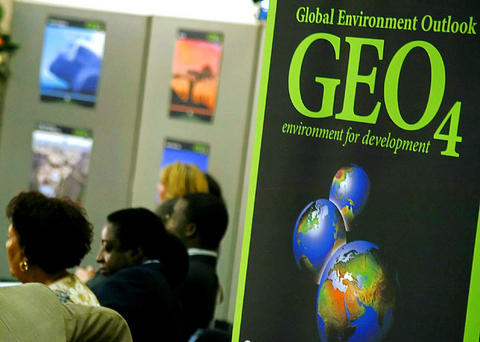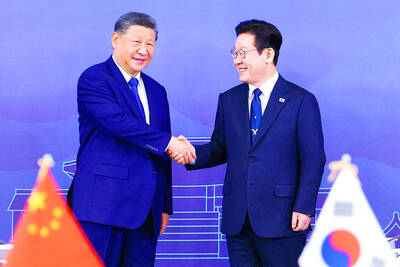The human population is living far beyond its means and inflicting damage to the environment that could pass points of no return, according to a major report issued on Thursday by the UN.
Climate change, the increased rate of extinction of species and the challenge of feeding a growing population are putting humanity at risk, the UN Environment Program said in its fourth Global Environmental Outlook since 1997.
"The human population is now so large that the amount of resources needed to sustain it exceeds what is available at current consumption patterns," Achim Steiner, the executive director of the Environment Program, said in a telephone interview.

PHOTO: AFP
Many biologists and climate scientists have concluded that human activities have become a dominant influence on the Earth's climate and ecosystems. But there is still a range of views on whether the changes could have catastrophic impacts -- as the human population heads toward 9 billion by midcentury -- or toward manageable results.
The world population has been increasing, to 6.7 billion from 5 billion two decades ago. But the land available to each person has long been shrinking, to 2 hectares acres in 2005 from 8 hectares in 1900, the report said.
Population growth combined with unsustainable consumption has resulted in an increasingly stressed planet where natural disasters and environmental degradation endanger people, plants and animal species.
Persistent problems include a rapid rise of "dead zones," where marine life no longer can be supported because pollutants like runoff fertilizers deplete oxygen.
But Steiner said that western European governments had taken effective measures to reduce air pollutants; that Brazil had made efforts to roll back some deforestation; and that an international treaty to tackle the hole in the earth's ozone layer had led to the phasing out of 95 percent of ozone-damaging chemicals.
"Life would be easier if we didn't have the kind of population growth rates that we have at the moment," Steiner said. "But to force people to stop having children would be a simplistic answer. The more realistic, ethical and practical issue is to accelerate human well-being and make more rational use of the resources we have on this planet."
He said that parts of Africa could reach an environmental tipping point if changing rainfall patterns turned semi-arid zones into arid zones and made agriculture much harder. Another tipping point could occur in India and China, he said, if Himalayan glaciers shrank so much that they no longer supplied adequate amounts of water.
He also warned of a global collapse by 2050 of all species being fished, if fishing around the world continued at its current pace. The report said that more than twice as many fish were being caught as the oceans could produce in a sustainable manner, and that the level of fish stocks classed as collapsed had roughly doubled over the past 20 years, to 30 percent.
In the spirit of the UN report, President Nicolas Sarkozy of France outlined plans on Thursday to fight climate change.
He said he would make 1 billion euros, or US$1.4 billion, available over four years to develop energy sources and maintain biodiversity.
He said that each euro spent on nuclear research would be matched by one spent on research into clean technologies and environmental protection.

‘CHILD PORNOGRAPHY’: The doll on Shein’s Web site measure about 80cm in height, and it was holding a teddy bear in a photo published by a daily newspaper France’s anti-fraud unit on Saturday said it had reported Asian e-commerce giant Shein (希音) for selling what it described as “sex dolls with a childlike appearance.” The French Directorate General for Competition, Consumer Affairs and Fraud Control (DGCCRF) said in a statement that the “description and categorization” of the items on Shein’s Web site “make it difficult to doubt the child pornography nature of the content.” Shortly after the statement, Shein announced that the dolls in question had been withdrawn from its platform and that it had launched an internal inquiry. On its Web site, Le Parisien daily published a

China’s Shenzhou-20 crewed spacecraft has delayed its return mission to Earth after the vessel was possibly hit by tiny bits of space debris, the country’s human spaceflight agency said yesterday, an unusual situation that could disrupt the operation of the country’s space station Tiangong. An impact analysis and risk assessment are underway, the China Manned Space Agency (CMSA) said in a statement, without providing a new schedule for the return mission, which was originally set to land in northern China yesterday. The delay highlights the danger to space travel posed by increasing amounts of debris, such as discarded launch vehicles or vessel

RUBBER STAMP? The latest legislative session was the most productive in the number of bills passed, but critics attributed it to a lack of dissenting voices On their last day at work, Hong Kong’s lawmakers — the first batch chosen under Beijing’s mantra of “patriots administering Hong Kong” — posed for group pictures, celebrating a job well done after four years of opposition-free politics. However, despite their smiles, about one-third of the Legislative Council will not seek another term in next month’s election, with the self-described non-establishment figure Tik Chi-yuen (狄志遠) being among those bowing out. “It used to be that [the legislature] had the benefit of free expression... Now it is more uniform. There are multiple voices, but they are not diverse enough,” Tik said, comparing it

RELATIONS: Cultural spats, such as China’s claims over the origins of kimchi, have soured public opinion in South Korea against Beijing over the past few years Chinese President Xi Jinping (習近平) yesterday met South Korean counterpart Lee Jae-myung, after taking center stage at an Asian summit in the wake of US President Donald Trump’s departure. The talks on the sidelines of the APEC gathering came the final day of Xi’s first trip to South Korea in more than a decade, and a day after his meeting with the Canadian prime minister that was a reset of the nations’ damaged ties. Trump had flown to South Korea for the summit, but promptly jetted home on Thursday after sealing a trade war pause with Xi, with the two